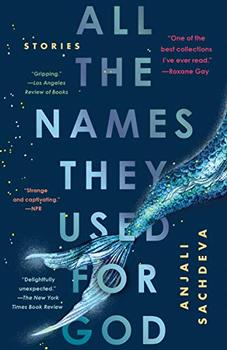Summary | Excerpt | Reviews | Beyond the book | Read-Alikes | Genres & Themes | Author Bio

Stories
by Lesley Nneka ArimahEven if it might be unfair to the enormously talented Lesley Nneka Arimah to refer to another immensely gifted short story writer when reviewing her work, I couldn't help myself - because it was Jhumpa Lahiri that I was reminded of after reading the absolutely spellbinding first story, "The Future Looks Good," in Arimah's debut.
Just like Lahiri, Arimah knows how to pack a jaw-dropping punch in the very last sentence of a story. There are brilliantly placed nuggets throughout this tale about a young Nigerian woman, Ezinma, who carries the weight of generations past on her shoulders, and whose life narrative is Exhibit A in how difficult it is for many of us, especially the poor, to break free from the circumstances and class into which we are born.
This central theme, of place and circumstance molding our lives, runs deep through the collection, its effect particularly noticeable on many of Arimah's young women protagonists. In "War Stories," for example, a schoolgirl's successful confrontation of the reigning Queen Bee feels like a major victory, especially since there are dark tragedies at home to confront: the death of her sibling, and their father's consequent depression. Tragedy again threatens to shape the choices that a young mother, Buchi, must face in "Buchi's Girls" when she is forced to live as a second-class citizen with her sister and her husband in Nigeria, and has to figure out if giving up her older daughter for adoption into a more comfortable family is the only way out of eternal misery. It's a delicately crafted story tracing the gradual and touching evolution of Buchi's situation.
Although the primary veins flowing through this collection touch on grief and tragedy, the volume as a whole doesn't feel like a Debbie Downer because Arimah knows just when to pull back before a story starts to wallow in its own excesses. Even in Buchi's case, the final resolution is left to the reader, leaving room for a small sliver of hope. Besides, there's plenty of wry humor in the stories, especially when Arimah explores Nigerian expats in the United States navigating their relationships with both their home country and newly arrived Nigerians.
In "Glory," one of my favorite stories, a young woman starts off with a rather auspicious name, Glorybetogod Ngozi Akunyili, but, as Arimah writes with a touch of tongue-in-cheek humor, Glory's parents could never have seen that such a christening would not comply with Facebook's "real name" policy. Nor could her parents have predicted that their talented daughter would one day come to be "nearing thirty, chronically single, and working at a call center in downtown Minneapolis," eating a three-for-a-dollar burrito bought at a local discount grocery store for lunch practically every day. Glory imagines her curated Facebook life, one where her cousin back in Port Harcourt, Nigeria would like her post and "another friend would confess her envy, and others still would say how (OMG!) she was sooo lucky. And for a moment," Arimah writes, "she would live the sort of life her parents had imagined for her those many, many years ago." Keeping the weight of her parents' expectations squarely in mind, when opportunity presents itself in the form of Thomas, a Nigerian MBA student who tempts her at the call center, Glory carefully weighs her choices and calibrates her decisions accordingly. The story is a masterclass in how to reveal a layered look at the many compromises we make that erode our dreams every day.
The collection has a couple of Nigerian folk tales thrown in which further balance the overall mood of the book. In the titular story, Nneoma, a mathematician, has a special gift for absorbing people's grief. When a man who has a similar talent commits suicide (he falls to his death from the sky as the story's title suggests), Nneoma realizes that her special abilities can also be a burden.
Each story in Arimah's nuanced collection is tinged with the complexities of the human experience. The writer Junot Diaz once said that writing a short story was especially challenging because "you spend 16 years chefing in the kitchen, and all that's left is an amuse-bouche." But if the amuse-bouche is as glorious as Arimah's debut, all is forgiven. The result here is most definitely worth the labor.
![]() This review was originally published in The BookBrowse Review in May 2017, and has been updated for the
April 2018 edition.
Click here to go to this issue.
This review was originally published in The BookBrowse Review in May 2017, and has been updated for the
April 2018 edition.
Click here to go to this issue.

If you liked What It Means When a Man Falls from the Sky, try these:

by Jennifer Nansubuga Makumbi
Published 2021
International-award-winning author Jennifer Nansubuga Makumbi's novel is a sweeping and powerful portrait of a young girl and her family: who they are, what history has taken from them, and--most importantly--how they find their way back to each other.
Published as The First Woman in the UK.

All the Names They Used for God
by Anjali Sachdeva
Published 2019
For fans of Dave Eggers and Kelly Link, an exhilarating collection of stories that explores the mysterious, often dangerous forces that shape our lives - from censorship and terrorism to technology and online dating.
What really knocks me out is a book that, when you're all done reading, you wish the author that wrote it was a ...
Click Here to find out who said this, as well as discovering other famous literary quotes!
Your guide toexceptional books
BookBrowse seeks out and recommends the best in contemporary fiction and nonfiction—books that not only engage and entertain but also deepen our understanding of ourselves and the world around us.